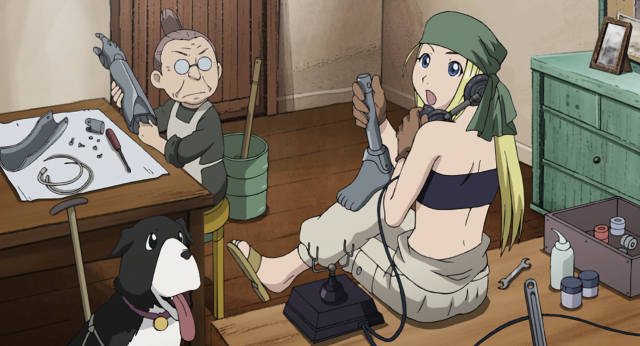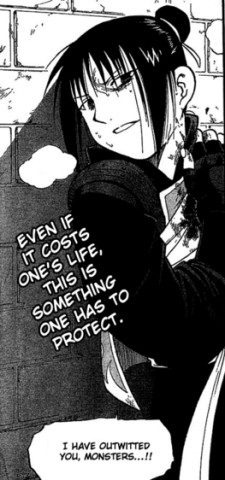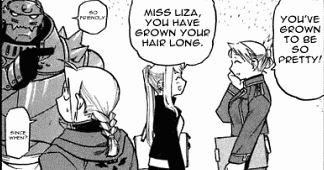A Girl’s Gotta Have Guts: Representation of Women in Hiromu Arakawa’s Manga
Beware passing housewives.
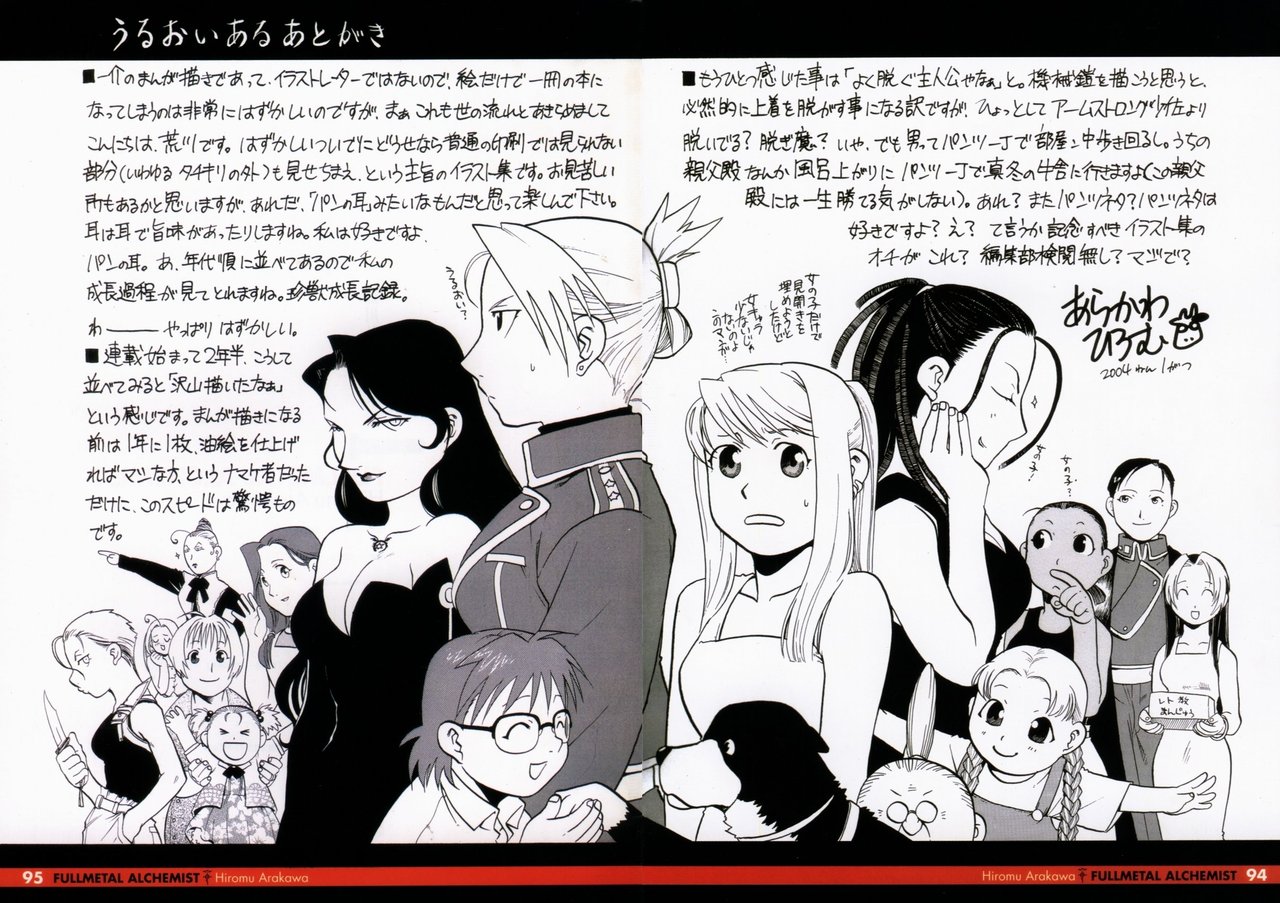
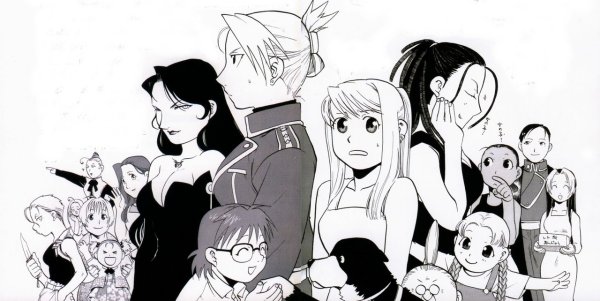
As a creator of shonen (“boy’s”) manga, Hiromu Arakawa is a woman working in a male-dominated industry. I noted in my last article about Arakawa that she has spoken about how she actively tries to include a varied female supporting cast in her manga. Her efforts pay off—Arakawa’s female characters are often well-rounded and dynamic with their own complex character arcs and personal goals.
Arakawa once said that a great manga artist is “someone who can find the perfect balance between complying with readers’ expectations and betraying said expectations.” Arakawa seems to employ this philosophy in her own work to challenge her audience’s expectations about gender.
While her stories employ some gender tropes that are commonly present in shonen manga, action stories, and coming-of-age stories with male main characters, she also (whether consciously or not) confronts quite a few clichés and tears them apart with her narrative. By doing this, she subtly encourages her readers, mainly young boys and girls, to challenge the stereotypes about women that they see in other fiction or even in real life. 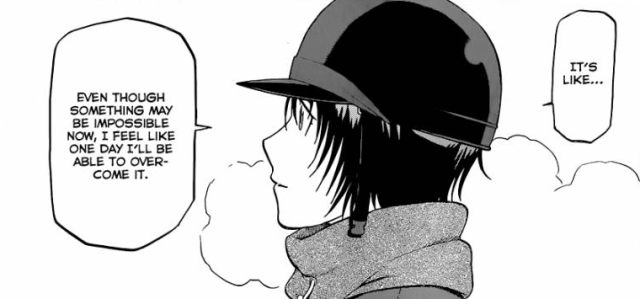
The main heroine of Silver Spoon discussing her goals
So, let’s kick back for an in-depth examination of important and sometimes subversive aspects of how Arakawa represents women in her two major works, Fullmetal Alchemist and Silver Spoon. This is only an analysis from my own very limited viewpoint—I have no real insight into the context Arakawa operates in or her intent. There will also be quite a few spoilers.
Working Women and Action Heroes
Arakawa once stated, “Our family motto is ‘those who don’t work, don’t deserve to eat.’ Everyone has to work hard to make ends meet, including women and kids. That’s the reason there are so many working women in Fullmetal.”
Pinako (l) and Winry
She points directly to Winry and Pinako Rockbell from Fullmetal as an example of this. The grandmother and granddaughter are skilled mechanics who run their own automail business, which the main character of Fullmetal depends upon. Since Winry builds and provides maintenance for Ed’s limbs, Ed owes his mobility and ability to do alchemy to her. The mechanic profession is shown to be male-dominated in Fullmetal, like it currently is in real life, yet Winry thrives in her career and is incredibly accomplished. She even strikes out on her own at age 15 to establish herself in a busier area and have a wider range of customers.
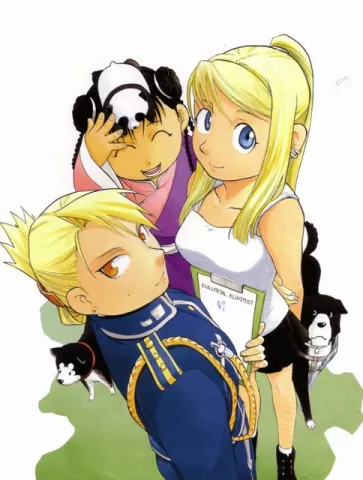
(l-r) Riza, May and Winry
In addition to Winry and Pinako, many other women in Fullmetal are accomplished in their fields. Izumi Curtis is one of the most powerful alchemists in the story and taught the protagonists most of what they know about alchemy and martial arts. May Chang is an accomplished alchemist and martial artist, despite being around twelve years old. The military is shown to be male-dominated, yet the military women in the series are incredibly skilled and prominent. The sharpshooter Riza Hawkeye and the General who rules the border of the country with an iron fist, Olivier Mira Armstrong, are examples of this. Women are also shown to work as bodyguards for men—both Riza and the martial artist Lan Fan work occupy that role. The female students in Silver Spoon are similarly all hardworking farmers with their own career goals.

Aki Mikage
The main heroine, Aki Mikage, is torn between her duty to take over her family’s farming business and her desire to work in the stables with Ba’nei horses. (Ba’nei horses are incredibly huge. Aki’s uncle protests to her once that it’s dangerous for women to work with them, and she shuts him down by pointing out a lot of women do so.) 
Tamako Inada (l) and her parents
Tamako aims to take over and reform her family business and then do the same to the entire agricultural industry. Arakawa routinely shows women succeeding in male-dominated fields. By doing so, she encourages her readers to see women as capable of thriving in fields that traditionally don’t welcome women. Considering that she is a woman currently succeeding in a male-centric industry, perhaps Arakawa sees it as important to encourage more girls to follow in her footsteps and make the “man’s world” a more balanced one.
Subverting Assumptions about Women
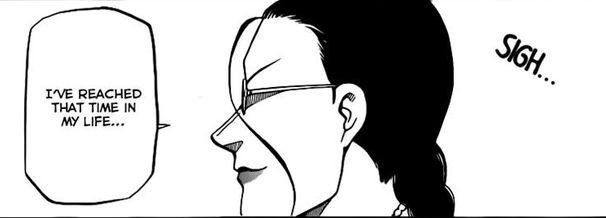
The teacher in Silver Spoon setting up a joke
Arakawa often humorously makes her readers second-guess their stereotypes about women’s roles. At one point in Silver Spoon, the pig farming teacher reveals to her students she’s retiring because “she’s reached that time in her life.” The students (and probably the average Japanese reader) assume she’s getting married, only for her to reveal she decided to become a big game hunter.
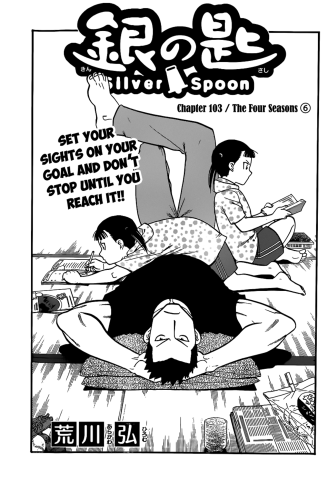
The hardworking little sisters
A trope commonly seen in coming-of-age stories plays out in Silver Spoon—a boy quits high school to support his single mother after their business goes bankrupt. However, the mother confronts her son with the fact she’s been providing for the family just fine on her own all these years, so he is free to do what he wants. His sisters also have a plan to get into college without his help so they can support him financially. The boy is confronted with the fact the women of the family are much more capable of providing for him than he is for them.
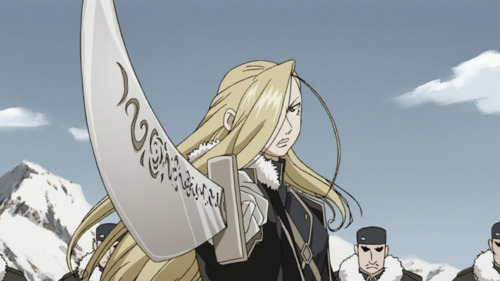
Olivier
In Fullmetal, General Olivier uses a man’s assumption that she must be devastated to be past child-bearing age to pull one over on him. Through these incidents, and others, Arakawa subtly nudges her reader to rethink the sexist assumptions they make about women’s desires and goals.
Exploring the Worth of Traditionally Feminine Occupations and How They Can Inspire Men 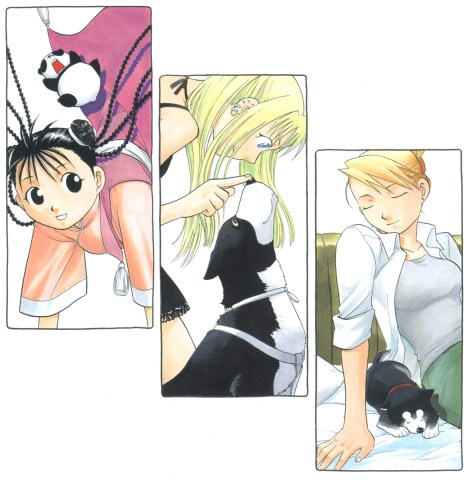
May, Winry, and Riza
While Arakawa makes sure to show a lot of career women and women in action-oriented positions, she does not undervalue the importance of more feminine occupations.
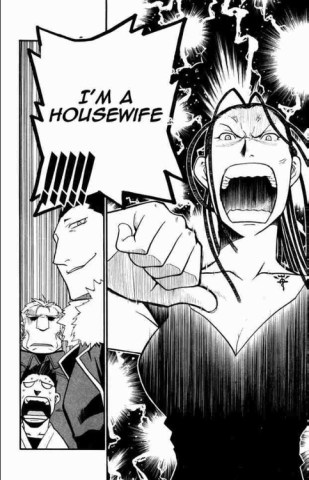
When you hear Izumi Curtis say this, it’s a good idea to run…
She plays with the assumption that the Elric’s unstoppable mentor would have to be a burly man before revealing that they were in fact a tough, terrifying, and somewhat sickly middle-aged housewife. Far from being ashamed of her occupation, Izumi will proudly declare her housewife status before proceeding to kick a man’s rear up and down the street.

May Chang has fantasies that could come right out of shoujo manga
May Chang is a terrifying opponent who doesn’t hesitate to utterly destroy enemies, but she’s also a pink-clad princess who has rose-tinted fantasies about hot boys. 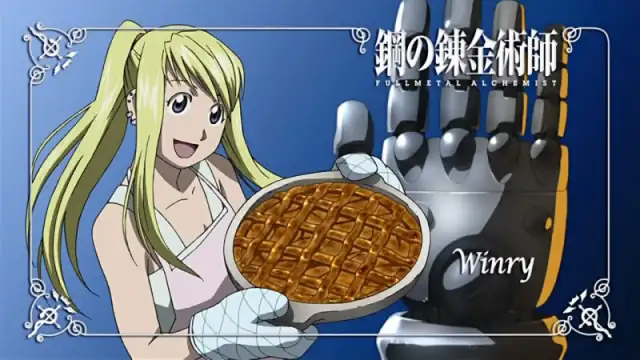
Winry is a tough mechanic but also a very nurturing, emotional person. She’s shown to enjoy baking and be domestically skilled. Since Winry has medical know-how and puts Ed’s limbs back together when they break, in some ways she is in the traditional “civilian healer” role women tend to occupy in action stories. But the work Winry does as a healer is shown to be just as impressive and important as the daring deeds that Ed and Al do, and perhaps even more admirable. 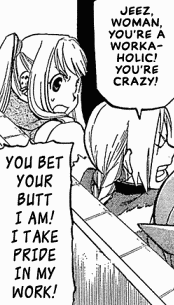
Winry tells Ed how it is.
A huge theme of Fullmetal Alchemist is the power to create versus the power to destroy, and as someone who builds new limbs for people, Winry is the embodiment of the former. Winry’s “traditionally feminine” work as a healer is shown to require just as much grit as anything Ed does. A scene where she prepares to deliver a baby in the 2009 Fullmetal anime is accompanied by epic fighting music to underscore this point. 
Ed admires Winry.
Ed often admires Winry’s skill and ability to save lives. He notes she is able to do what he with his alchemy can’t—bring human life into the world. In many ways, Winry is our protagonist’s hero. She is what he aspires to be—a human who creates rather than an alchemist who destroys. Through Winry, Arakawa challenges the idea that women who aren’t action heroes have less value than those who are.

Hachiken’s mom
Silver Spoon also calls for respect towards traditionally feminine occupations. Working with food helps Hachiken realize that he has taken for granted how much work his mother (who appears to be a housewife) puts into making the family meals.
Obviously, gender roles and the idea of “women’s work” operate differently in Japan, so it’s more likely to see “tomboy” characters have a “secret feminine side” or female characters who are ashamed of their masculine nature in manga. But for Arakawa’s characters, it’s not a matter of secrecy or shame- the two sides coexist comfortably and are presented as equally valuable.
Moreover, the value of the work women have traditionally done is explored in-depth, and it’s shown that men can benefit from valuing it and learning about it. Exploration of women and the work they do, whether traditional or non-traditional, is always valuable. And though it may be perceived differently in Japan, seeing characters who are allowed to be martial artists and housewives and mechanics and cooks is valuable from a Western perspective, because our media can fail to recognize how multifaceted women can be.
A Variety of Ladies
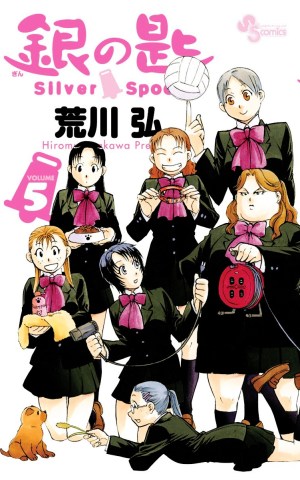
The female students in Silver Spoon
In addition to women occupying a variety of roles, Arakawa’s women also have a variety of ages and appearances. She admits to favoring voluptuous women, and a lot of her women fall into that thin-but-busty body type. However, there are quite a few older women and women who aren’t conventionally attractive in her stories. One of the prominent characters in Silver Spoon is an overweight young girl who is entirely comfortable with her body, a rarity for manga.
Subverting Tropes: Giving the Civilian Female Character Her Due
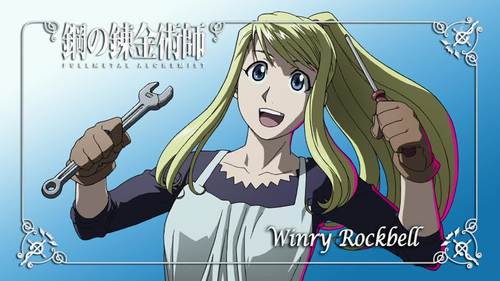 Everyone’s probably familiar with the trope—the superhero’s girlfriend or female relative provides endless support, yet the protagonists don’t ever have to consider her problems. She exists for them, and her life outside them is not of consequence. Not only that, the protagonists don’t see fit to tell her their secret identities, what they’re doing, or even let her in on things that directly affect her (like the threat of villians coming for her). And all for her “protection.” Arakawa presents a similar situation, with the boys depending on Winry but keeping things from her, but then smashes it apart by showing the consequences of treating someone this way. Winry is vocally upset about the boys leaving her out. A huge part of Ed and Al’s character arcs are about how they need to realize that shutting Winry out “for her own good” is hurtful and disrespectful.
Everyone’s probably familiar with the trope—the superhero’s girlfriend or female relative provides endless support, yet the protagonists don’t ever have to consider her problems. She exists for them, and her life outside them is not of consequence. Not only that, the protagonists don’t see fit to tell her their secret identities, what they’re doing, or even let her in on things that directly affect her (like the threat of villians coming for her). And all for her “protection.” Arakawa presents a similar situation, with the boys depending on Winry but keeping things from her, but then smashes it apart by showing the consequences of treating someone this way. Winry is vocally upset about the boys leaving her out. A huge part of Ed and Al’s character arcs are about how they need to realize that shutting Winry out “for her own good” is hurtful and disrespectful. 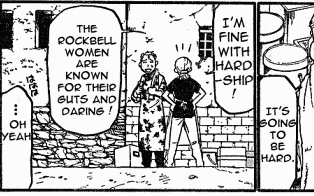
Winry’s mom is shown to share her spirit in a flashback.
Moreover, it is fully acknowledged that Winry has her own problems to deal with—she struggles with her identity and finding the right path to take in dealing with the loss of her parents. Arakawa makes a point that because of this, Winry can’t just function as constant emotional support without getting any from the boys in return. Arakawa takes great pains to show that while Ed and Al are a big part of Winry’s life, she has a fulfilling existence outside of them. The fact that Winry has her own career, acheivements, and a community that depends on her is what keeps her going.
Essentially, Winry is the hero of her own story. Through Winry, Arakawa encourages her male readers to be more respectful of the women in their lives. She also encourages her readers not to see women as an endless source of emotional healing and support, but as complex people with their own lives and goals who also require support at times.
Subverting Tropes: Promoting the Importance of Emotion and Communication
Arakawa’s work challenges another common cliché: the idea that it is better not discuss your feelings and that “real men” don’t show emotion. Early on in Fullmetal, a male character tells Winry that the reason Ed and Al don’t talk about their feelings is that “men speak with their actions” and “hide their pain so as not to burden their loved ones.”
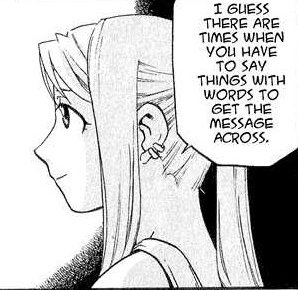
Winry proves communication is important.
However, Winry proves that her way of handling things—by actually communicating her feelings—works a lot better than that macho nonsense. She ends up resolving a conflict with communication. She informs the male character that sometimes you do need to communicate with words, and he agrees with her. Arakawa explicitly shows that the more “feminine” method of being open about your feelings actually gets things done, and that burying your feelings hurts your loved ones more. This is a really good lesson for young people to learn, especially boys, who are often taught to be ashamed of their emotions.

Aki and Hachiken
But it’s not only boys to will hide their feelings so as not to not burden others. In Silver Spoon, the main character, Hachiken is an emotional worrier who encourages the closed-off Aki to talk about her problems. The switch-up in Silver Spoon shows Arakawa’s awareness that these issues don’t always follow strict gender divides. Boys can be naturally emotional, while girls can find it hard to express their feelings. Whichever it is, Arakawa encourages her readers, male and female, to recognize the importance of communication.
Subverting Tropes: Challenging the Damsel in Distress and Lack of Female Agency
The “damsel in distress” trope is incredibly common in action stories, especially ones with a male protagonist. A female character close to the hero will be put in peril in order to motivate him. The villain in the story often does this knowingly, seeing the woman in question as nothing but an object to use as leverage against the hero. The narrative will often back the villain up in this—the female character may protest or fight, but ultimately she will fulfill her function as a motivation for the hero. Arakawa encourages her readers to question this particular trope by putting it in play and then tearing it apart. In Fullmetal, the villains threatens the women close to two male protagonists—Winry is threatened to force Ed and Al’s hand, and Riza is threatened to force the hand of her partner Roy Mustang.

Try to hold Winry hostage if you want, but she’s got it under control.
However, not only do both women engineer their escapes, they turn the hostage situation to their advantage and save others. It initially looks like Winry has been kidnapped by another faction, only for it to be revealed this was a clever trick Winry engineered to fool her captors and allow her allies to escape. Winry recognizes that her captors see her as a victim without agency and turns this into their downfall. Arakawa even frames the narrative in a way that forces the reader to feel foolish for assuming Winry was helpless. Riza, on the other hand, uses her position as a hostage to gather intel for the resistance.
The most important thing about these situations is the female characters are ultimately put in peril to further their stories more than those of the male characters. Winry’s hostage situation is largely a device to bring her into a confrontation with her parents’ killer, and her story takes center stage during this confrontation, with Ed and Al acting as her support.
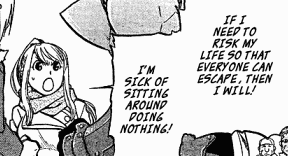
Winry puts her foot down
Moreover, in taking control of the situation, Winry is finally able to confront her fear of being a burden to her loved ones, resolve her issues with feeling helpless, and even figure out her identity. It also shows Ed’s positive development in that he doesn’t prevent Winry from making her own choices out of a desire to “protect” her.
 Riza as a character is shown to value her own agency. In her backstory, her father used her as a tool, so she broke ties with him and chose where she wanted to work for herself. Riza’s arc largely focuses on her desire take full responsibility for her choices and not be viewed as a victim.
Riza as a character is shown to value her own agency. In her backstory, her father used her as a tool, so she broke ties with him and chose where she wanted to work for herself. Riza’s arc largely focuses on her desire take full responsibility for her choices and not be viewed as a victim.
So it is incredibly significant that when a villain threatens to kill Riza unless Roy complies with his demands, and Riza requests Roy not do it and assures him that she is fine, Roy complies with her wish. Arakawa explicitly shows it as important to respect a woman’s wishes in regard to her own life, even if one doesn’t agree or wants to protect her.

And of course, Riza is in control of the situation and even signals Roy that help is on the way. Riza is not just put in danger to further Roy’s narrative. This situation is used to promotes a respect for Riza’s agency and show how she has developed into a person who is fully in control of her life. Rather than Roy saving Riza, Riza saves Roy from making a bad decision.
Lan Fan outwits her opponent.
In another example, Lan Fan is injured and a male character has to carry her. The villainous opponent refers to Lan Fan as “useless baggage.” But she turns the situation to her advantage to outsmart the villain, protecting the boy carrying her in the process and proving that it’s a mistake to dehumanize her.
Arakawa encourages readers to respect women’s wishes and allow them to make their own life decisions rather than limit them in the name of protecting them. Another message is the importance of not thinking of women as props or extensions of men. She does not merely present her female characters as escaping their situation, but makes that situation serve their story. More writers would do good to follow her example.
Arakawa also tells a story where women defeat those who try to entrap them and reclaim their own agency. In the real world, women often have people trying to take their autonomy from them, so seeing women struggle against this and triumph can be both relatable and powerful for readers. This is especially true when you consider Riza’s backstory involves her breaking ties with an abusive parent.
Women as Influential
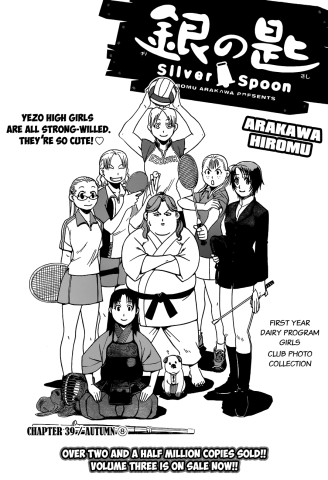
The girls of Silver Spoon
Arakawa’s work shows women to be incredibly influential in both the general events of the narrative and in the lives of male characters. The protagonists of Fullmetal Alchemist essentially owe their formation as heroes to the women in their lives. In addition to being their alchemy and fighting mentor, Izumi is shown as greatly influential to Ed and Al’s moral values. As noted above, Winry is also a big influence and inspiration for the brothers. Roy respects Riza so much that he gives her authority over his very life. Many other male characters are inspired by women and seek out their teachings.

Hachiken talks about Aki.
In Silver Spoons, Hachiken didn’t get into horseback riding because he had a crush on Aki, but because he was impressed with how cool she was while riding and wanted to be like her. With Aki’s guidance, horseback riding becomes a big part of his life. Arakawa subtly encourages boys to be open in their admiration of women and see women as influential figures. She also shows girls they are capable of making an impact on those around them.
Points of Criticism
While Arakawa’s manga subverts and challenges a lot, it is by no means perfect. All of these women are of course supporting characters, and many of the prominent women in Fullmetal have men play an important role in their motivation and goals. Often it takes a form of a partnership for the same goal, with both characters needing each other to truly achieve success, but it can’t be denied it falls into the trend of a great deal of the female characters in fiction having their goals heavily tied to men. Men also outnumber the women in Fullmetal. And as you can probably tell, the Elric brothers’ mother was fridged to kick off the story.
Riza and Winry being friends
Also, while there are female friendships and relationships in Fullmetal, and women are shown to positively influence each other, these relationships are not given nearly as much screen time and development as male-male or male-female relationships. The Bechdel Test is passed a few times throughout the manga, but it barely makes it into the double-digits.

Aki and her friend Ayame.
Silver Spoon does much better. The female relationships are more prominent throughout, and it passes the Bechdel test quite often. 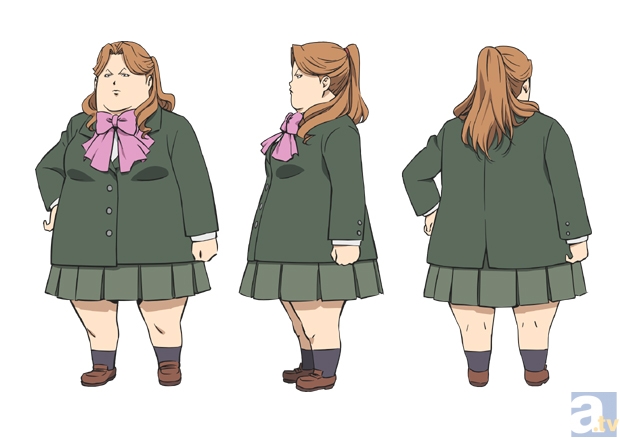
Tamako
There are a few sexist comments boys make that aren’t really addressed (mostly in Silver Spoon), and though Tamako is an example of a great character who is comfortable being overweight, the way she’s drawn is a bit caricature-ish. How the boys initially mock her is uncomfortable, even if she doesn’t care. They eventually stop their mockery for the most part, but they are not shown apologizing. There are also no canonical LGBTQ women in Arakawa’s manga as of yet, so don’t expect that.
Watch and Read it!
While imperfect, Arakawa’s work is fascinating in the way it often plays with and subverts gender expectations. It’s not only her presence as a female artist that makes Arakawa part of the changing face of the shonen manga industry, but the twists she brings to the table.
If you want to check out Arakawa’s work, the Fullmetal Alchemist manga is available from Viz Media and on Amazon (in box set, individual volumes, and 3-in-1 omnibuses). The Fullmetal Alchemist: Brotherhood anime is available on Funimation’s website and YouTube Channel, plus on Hulu, Netflix, and Amazon. There is another anime adaptation of Fullmetal that was made in 2003, but it is very loosely based on the manga and diverges dramatically. Many of the characters, themes, and events discussed in this article are not present in that anime.
The Silver Spoon anime is available on Crunchyroll and Hulu and can be purchased on Aniplex and Amazon. The manga has yet to be licensed.
Caitlin Donovan is a longtime comic geek and internet blogger who is currently working on her MFA and her first novel. She formerly wrote for Big Shiny Robot and for a time helped run the blog When Fangirls Attack. These days, she mostly can be found blogging on her Tumblr, Lady Love and Justice.
- Get to Know a Manga Artist: The Unstoppable Hiromu Arakawa
- The Philosophy of Fullmetal Alchemist‘s Hiromu Arakawa
- Presenting the Great Fullmetal Alchemist Anime Showdown
Are you following The Mary Sue on Twitter, Facebook, Tumblr, Pinterest, & Google +?
Have a tip we should know? [email protected]
